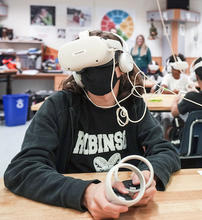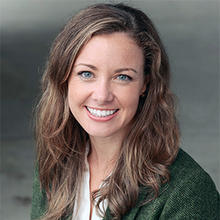- December 12, 2022
Faculty, staff, and students from three units across Mason have worked together to create a new VR experience so elementary students can take a “field trip” to the Mason apiary and learn from an expert beekeeper.
- November 29, 2022
Mehmet Altug, an associate professor of operations management, has been researching retail returns policies for a decade. The issue has recently come to prominence, as the lenient policies of online retailers have led to skyrocketing return rates (now exceeding 20 percent in the U.S.). Altug’s various academic papers delve into the difficult trade-offs retailers face when setting returns policies. While there are no easy answers, Altug’s research identifies factors that can help retailers achieve more strategic flexibility.
- October 19, 2022
For most drivers in the U.S., obeying a stop sign upon approaching an intersection is an unavoidable annoyance. But for Mason finance professor Jiasun Li, it’s a problem waiting to be solved. His recent working paper proposes a simple and economical improvement: removing one stop sign from every four-way intersection. According to his calculations, this would boost not only driver safety, but environmental sustainability as well.
- September 26, 2022
Jingyuan Yang, an assistant professor of information systems and operations management at Mason's School of Business, is at the forefront of AI research that aims to crack the codes of the physical world. Her results so far point toward innovative solutions for some of the biggest societal, governmental, and business challenges we face.
- September 14, 2022
Today's workforce might best be described in terms of tumult: Great Resignation, Great Retirement, Great Reshuffle, etc. In this "new normal," managers must learn to navigate a state of continual transition in their teams and organizations, while keeping up with day-to-day demands. Likewise, George Mason University School of Business Management Professors Sarah Wittman and Kevin Rockmann believe that it is time for scholars to change the way they think about role transitions to better align their theories with our increasingly uncertain world.
- August 30, 2022
In her 2021 PhD dissertation, Ashley Yuckenberg, a trained journalist and assistant professor of business communications at Mason, plumbs the ethical quandaries of crisis coverage—and provides a framework for guiding journalists through them.
- August 9, 2022
Brian Ngac and Nirup Menon, from the information systems and operations management area at the School of Business, were recently awarded a $100,000 grant from the Commonwealth Cyber Initiative (CCI) located in Arlington, Virginia. This Commonwealth Cyber Initiative Grant was awarded for their proposal to develop a new experiential learning program that will engage students and companies from the Commonwealth.
- July 21, 2022
Hierarchy has its upsides and downsides. A pyramidical power structure works well for day-to-day decision making. But as the distance between the base and the tip of the pyramid increases, tensions between organizational tiers can create obstacles to reform. It’s a matter of “the unconscious dynamics of humans in groups and systems” rather than a deliberate response, says Renee Rinehart Kathawalla, a postdoctoral research fellow of management at Mason.
- July 13, 2022
In her latest book, Victoria Grady delves into 20 years of research on how people—and their brains—react to change in the workplace and beyond.
- May 9, 2022
George Mason University professor Sarah Wittman said the usual offboarding process is rote: effectively a checklist, and it doesn't need to be.










